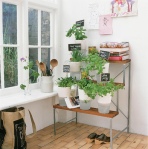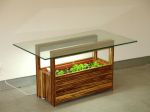Keep It Fresh
With the rising price of fresh fruits and vegetables, I took it upon myself to discover the magic of indoor gardening. I wondered if it was something I could manage with a small one bedroom apartment with no yard or balcony. It was definately a surprise to find that having an indoor garden really doesn’t have to take up too much space. Unfortunately, I have yet to find an apartment friendly guide to growing fruit. However, you can at least save a buck or two when it comes to veggies! Personally, I wouldn’t mind sacrificing some room to have fresh, free vegetables (unless you’re counting the price of seeds…)
The best straight-forward, dummy proof indoor gardening guide on the web is through eHow: How to Grow an Indoor Vegetable Garden. It breaks it down into easy steps in a nice comprehensible list. Through further research (reference guides are everywhere), I found the top vegetables to grow are: Pepper (green), Cucumber, Radishes, Leafy Greens (lettuce, spinach), Tomatoes, and Eggplant. They need a room tempature to be ranging between 65-75 degrees farenheight and a sunny windowsill. Between these six vegetables it generally takes 1 to 3 months before they’re ripe for the pickin’.
To the full benefits, I suggest using organic soil and making your own compost! A.T.T.R.A’s National Sustainable Agriculture Information Service page is a very detailed guide (which you will need) that helps you to: better understand commercial blends, how to make your own soil, know what ingredients are allowed, and who sells organic soil among other things.
For around $20 you can pick up a small ’Compost Pot’ at Walmart, Lowes, Kmart, or just about anywhere. Composting is pretty cut and dry. This will be more beneficial if you often cook and find yourself throwing away a lot of vegetable or fruit peels. There are a many different composting guides out there, but Eco Walk The Talk is the most appropriate for this blog. They will give you a good break down of the science behind composting, ingredients, and what to expect.
I’m Just Saying…
On a more personal level, I see this as an opportunity to also help local farmers. The money you don’t spend on those store bought vegetables can go towards buying your fruits and veggies from the local farmer’s market. A majority of our foods today aren’t fresh or natural. That has turned into common knowledge. Too many chemicals are being pumped into our foods that end up in our bodies.




Leave a comment